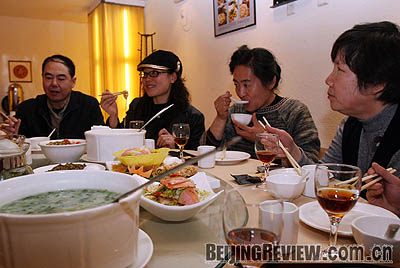|

MEATLESS FEAST: Diners enjoy a meal in a vegetarian restaurant in Beijing on March 16
CHEN XIAOGEN
A vegetarian diet, once associated with monks or priests, has become fashionable in China, spawning the launch of a raft of restaurants catering to a new no-meat clientele.
Several online surveys conducted by AC Nielsen, a leading global provider of market research information services, show that young people make up the majority of Chinese vegetarians. For the young, saying no to meat is a way to express their lifestyles and values.
In addition to the pursuit of health and respect for animals, people who choose to be vegetarians also say they have no confidence in the safety of meat. Often they are wary of the food given to farm animals. Although choosing a vegetarian diet is just about food, it shows a new attitude to the world around.
Vegetarians can be divided into two groups: strict vegetarians (vegan) and ordinary vegetarians (vegetarians), but in the eyes of non-vegetarians, the difference between the two is negligible, that is "none of them eat meat."
"After I had been a vegetarian for some time I met my boyfriend Gu Yue, but I felt strongly after a while that I had fallen in love with a ‘killer,'" said Ning Er, who works in a foreign company in Beijing. Gu was born in Guangdong Province. People there are famous for their love of meat. There is a saying that "they can eat everything flying in the sky except for the planes, and everything running on the ground except for the trains." The difference in eating habits between Ning and Gu caused many conflicts. "Although he is a nice guy, I made up my mind several times to break up with him," said Ning.
Gu gradually came to agree with his girlfriend that rejecting meat was the right thing to do and quit. He said it was a vegetarian restaurant in Shanghai called Jujube Tree that caused his transformation.
On each wooden table in Jujube Tree there is a small sign that says, "Pure persistence, for our planet, for your health." The boss of the restaurant, Zeng Fangying, is a vegetarian. Several years ago, her mother-in-law was diagnosed with cancer and was told she had six months to live. After switching to a vegetarian diet her mother-in-law lived several years longer. Zeng became a vegetarian after that. "The vegetarian lifestyle gives me new understanding toward life," she said.
In addition to respecting all life, some turn to vegetarianism because they believe it helps protect the environment and prevent world hunger. Zhou Yongshan is a young teacher from Taiwan. He is busy giving lectures around China on how to eat healthily. "The amount of carbon dioxide emitted by an ox per year equals that emitted by a car," he said. Raising poultry on a large scale needs more feed, which needs more land and leads to the cutting of the trees. Sandstorms across China have become increasingly serious in recent years, and huge areas of grassland have become deserts due to overgrazing. All these have sounded alarm bells and led to a rising tide of vegetarians, according to Zhou.
Ning said she did not think about this much when she became a vegetarian at first. Initially she just wanted to lose weight. At first, she worried that a vegetarian diet might not provide enough nutrition, but a professor from the School of Life Sciences of Peking University told her that a vegetarian diet could provide more direct nutrition than meat. "The nutrition of meat also comes from the plants," she said. Now Ning, and many others like her, form a growing voice of vegetarianism around China, which could see diets and restaurants changing dramatically in years to come. | 